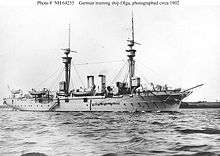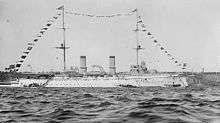Felix von Bendemann
Felix von Bendemann (8 August 1848 – 31 October 1915) was an Admiral of the German Imperial Navy (Kaiserliche Marine).
Felix von Bendemann | |
|---|---|
| Birth name | Felix Eduard Robert Emil Bendemann |
| Born | 8 August 1848 Dresden, Saxony |
| Died | 31 October 1915 (aged 67) Halensee |
| Allegiance | |
| Service/ | |
| Years of service | 1864–1907 |
| Rank | Admiral |
| Commands held |
|
| Battles/wars | Franco-Prussian War |
| Relations | Rudolf Bendemann |
Early life
Bendemann was born in Dresden, Kingdom of Saxony. He was the son of the painter Eduard Julius Friedrich Bendemann (1811–1889) and Lida Schadow, who was the daughter of the sculptor Johann Gottfried Schadow. The painter Rudolf Bendemann was his brother.
Naval career
Bendemann and three brothers served in the Franco-Prussian War in 1870-71. He was in the Prussian Navy as an officer on the gunboat SMS Meteor in Key West when the war began. On 23 October the news of the outbreak of war reached the ship’s captain, Eduard von Knorr. The SMS Meteor sailed for Cuba where, on 9 November they fought the only serious naval battle of the war with the French aviso Bouvet commanded by capitaine de frégate Alexandre Franquet. After an artillery exchange and an attempts by the Bouvet to ram the Meteor, both ships were incapacitated. Although the French left the scene of battle, the outcome was indecisive. As a result of this wartime conduct, he was honored with the then rarely given Iron Cross.[1][2][3]
Bendeman was enrolled in the German Imperial Naval Academy (Marineakademie) in 1874. In his class would be three other future admirals: Otto von Diederichs, Viktor Valois and Gustav von Senden-Bibran.

Lieutenant-Commander (Korvettenkapitän) Bendemann commanded the SMS Olga in 1884 as part of the newly formed West African-cruiser squadron (Westafrikanische Geschwader), again under Rear Admiral Eduard von Knorr, to carry out "gunboat diplomacy" in Germany’s Western African area of interest, the colony of Kamerun, against a local revolt. Troops landed from Knorr’s SMS Fürst Bismarck and the Olga stormed the rebels and by 22 December succeeded in defeating the rebels. This led to treaties with France and Britain recognizing Cameroon as a German Colony. Afterward, a pleased Kaiser Wilhelm I awarded Bendemann the Prussian Order of the Royal Crown, 3rd Class with Swords.[4]
He and the German navy suffered a misfortune on 16 February 1894. While Captain of the SMS Brandenburg taking a trial trip with forced drought the main boiler-tube burst, the explosion causing the death of over forty men.[5]
From 14 March until 31 December 1899, he served as Chief of the Admiralty Staff (Admiralstab). In this position he expressed his concern for what he saw as Germany's hopeless situation with a weak navy and facing Britain in isolation. One solution he saw an alliance with the United States, which was already a valuable trading partner of Germany.[6] He also favored such realpolitik actions as the violation of Danish neutrality, in case of war with Great Britain, by immediately occupying the waterways of the Danish archipelago (The Belts) to deny the Royal Navy access to the Baltic Sea and Russia.[7]

From February 1900 until 1902, he commanded the German East Asia Squadron (Ostasiengeschwader) from his flagships the SMS Irene, and then the SMS Hertha. When Bendemann took command of the East Asia Squadron, he found it unprepared for the challenges presented by the Boxer Rebellion. He actually had to borrow charts from the Russians and maps from the British in order to operate in the Yellow Sea.[8] Nevertheless, he forcefully advanced the idea of taking the Taku Forts and the ships under his command were able to make a noteworthy contribution in the Battle of Taku Forts.[9] On 8 June 1900 he brought the large cruisers SMS Hansa, SMS Hertha and the small cruisers SMS Gefion and SMS Irene before the Taku Fort (together with warships of other nations) to landing detachments of Seebataillone (marines) for the protection of their citizens in Tientsin[10] From 1903 through 1907, he was head of the North Sea Naval Station Marinestation der Nordsee in Wilhelmshaven.[1]
Admiral von Bendemann died in Halensee (Berlin) on 31 October 1915.
Honors
- 1870—Honored with the then rarely given Iron Cross
- 1884—Prussian Order of the Royal Crown, 3rd Class with Swords.
- 1902—Honorary Knight Grand Cross of the Order of St Michael and St George.
- 1905—Bendemann was raised to the Prussian nobility (knighted).[1]
- 1906—Japan's ribbon bar 1st Class, Grand Cordon was conferred on May 8, 1906, recognizing his actions as Commander of the Squadron during the Boxer Rebellion.[11]
- 1909—Inducted as member 390 of the Gesetzlose Gesellschaft zu Berlin.[12]
- 'Mount Bendemann' and 'Bendemann Harbour' in New Guinea were named in his honor by his friend Wilhelm Knappe, who was German colonial commissioner (Reichskommissar) in the area, 1887–1910.
See also
References
- Notes
- "Judentum in Deutschland" citing Dietrich Bronder. (1975). Bevor Hitler kam, pp. 324-346.
- "The Naval warfare in the Franco-German War 1870–1871 – Civilization Fanatics' Forums". Forums.civfanatics.com. Retrieved 2012-09-06.
- Clara Schumann: An Artist's Life Based on Material Found in Diaries and Letters by Berthold Litzmann; READ BOOKS, 2007 484 pages, p. 280.
- "Cameroon 1884". Medalnet.net. Retrieved 2012-09-06.
- German Emperor's Speeches... of the Emperor William II. Tr. Louis Elking. London: Longmans, Green, 1904. P. 239.
- Imperialism at sea: naval strategic thought, the ideology of sea power, and the Tirpitz Plan, 1875-1914 by Rolf Hobson; BRILL, 2002, 358 pages, p. 276.
- Naval warfare in the twentieth century, 1900–1945: essays in honour of Arthur Marder by Arthur Jacob Marder, Gerald Jordan; Taylor & Francis, 1977. p.34.
- By order of the Kaiser: Otto von Diederichs and the rise of the Imperial German Navy, 1865–1902 by Terrell D. Gottschall; Institute Press, 2003
- The origins of the Boxer War: a multinational study by Lanxin Xiang; Routledge, 2003, 382 pages, p. 282.
- "Axis History Forum • View topic – German Navy Overseas Deployments 1898–1914". Forum.axishistory.com. Retrieved 2012-09-06.
- British Library. "Handlist of Japanese Manuscripts Acquired Since 1984," 'Or. 14819 Certificate conferring Order of the Rising Sun on Admiral von Bendemann,' p. 3.
- "Chronologisches Mitgliederverzeichnis". Gesetzlose-gesellschaft.de. Retrieved 2012-09-06.
- Bibliography
- (in German) Bronder, Dietrich Karl Heinz. (1975). Bevor Hitler kam (Before Hitler Came). Geneva, Switzerland: Marva. OCLC 163226232
- Hildebrand, Hans; Henriot, Ernest (1988). Dermot Bradley (ed.). A–G. Deutschlands Admirale 1849–1945. Die militärischen Werdegänge der See-, Ingenieur-, Sanitäts-, Waffen- und Verwaltungsoffiziere im Admiralsrang. I. Osnabrück: Biblio. pp. 91–92. ISBN 3-7648-1499-3.